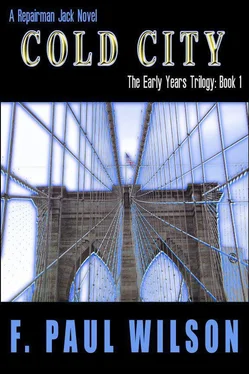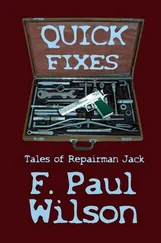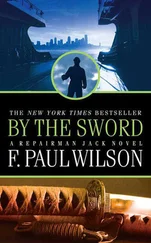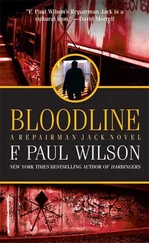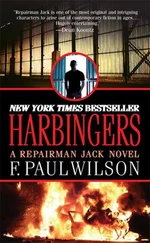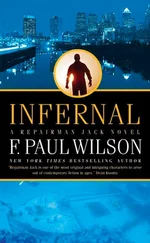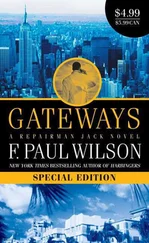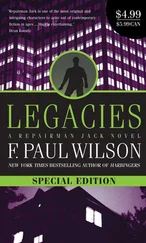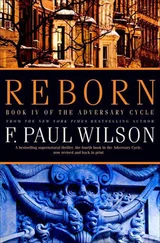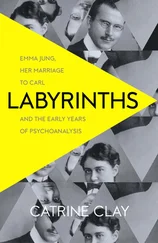“Better believe it.”
“Follow me. I may have something for you.”
3
Kadir Allawi watched the two Americans walk away. The older one’s face was familiar.
He, Tachus, Sayyid, and Mahmoud were taking turns with the AK-47 Mahmoud had brought along. When the magazine ran dry and he could hear himself think, Kadir tapped Sayyid on the shoulder and pointed to the pair.
“I’ve seen one of them before,” he said in Arabic. They spoke English only when necessary.
Sayyid’s round face darkened and his eyes narrowed as he stared. He looked almost Asian when he got like this. “You think they’re FBI? You think they’re watching us?”
Sayyid’s passion for jihad was the glue that held them together. Kadir admired him for that passion, but he was always suspicious, always angry. Sayyid saw enemies everywhere.
Then it came to him. Kadir grabbed Tachus’s arm. “That man, the older one – I’ve seen him with your uncle Riaz.”
Tachus squinted as his gaze followed the pair toward the parking lot.
“What is he doing out here?”
“Taking pictures of us, I’ll bet,” Sayyid said.
“No,” Kadir said. “They were shooting. But now I’m sure about him – he makes deliveries to your uncle.”
“Spying on him to get to us,” Sayyid said. “They followed us here.”
Kadir watched the younger one get on a motorcycle. “No, they were here first. I remember that motorcycle when we arrived.” He’d wished he had one like it.
Tachus spat. “Whoever he is, he must bring in a lot of profit, because that’s all Uncle Riaz cares about.”
Sayyid snorted and turned away. “My turn!” he said, pointing the assault rifle. “But first…”
He pulled a piece of paper from his back pocket, unfolding it as he strode onto the range.
“What’s he doing?” Tachus said.
Mahmoud grinned. “I think I know.”
Mahmoud had served among the mujahideen in Afghanistan after training for combat in Peshawar. He drove a taxi now and had had special T-shirts made up, reading Help Each Other in Goodness and Piety...A Muslim to a Muslim is a Brick Wall . A map of Afghanistan was superimposed in the middle. Sayyid attached the paper to one of the bull’s-eyes and hurried back. Kadir saw now that it was a blown-up black-and-white newspaper photo of a face – the bearded face of a man wearing a yarmulke. A rabbi.
Mahmoud was still smiling as he handed the reloaded rifle to Sayyid. “Let’s see how you kill the Jew.”
Kadir stepped back to watch. He’d met these three Egyptians this past summer at the Al-Farouq Mosque. He’d traveled from Jersey City to Brooklyn to hear the famous holy man, Sheikh Omar Abdel-Rahman. The blind cleric had arrived in August and quickly gathered a devoted following. Kadir, a Palestinian, had been welcomed by the Egyptians who told him his struggle was their struggle.
While he did not share their loathing of President Mubarak – at least he was an Egyptian ruling Egypt – they all shared an intense hatred of Israel.
Kadir was born the seventh of nine children in Israeli-occupied Palestine shortly after the Six-Day War. He grew up under the heel of the Zionists. His father finally moved the family to Jordan where he found work in a clothing store. But Kadir could find no work in that hard place, so he came to America. It might be the ally of hated Israel, but his mother’s brother had opened a bakery in Jersey City and promised Kadir a job. He saw no choice but to go. The bakery didn’t pay much and so he found extra work through Tachus in his uncle’s business.
Sayyid began firing wildly at the target. Most of his bullets kicked up the sand of the dunes behind. But finally he homed in and stitched a line across the rabbi’s face.
Kadir joined in the cheering as Sayyid raised the rifle over his head in triumph. Although he admired Sayyid’s devotion to the cause of jihad, his intensity could be intimidating at times.
He turned and watched the two Americans drive away, one in a truck, the other on his motorcycle, and wondered again why a man who dealt with Tachus’s uncle would be out practicing shooting. Then again, perhaps it made sense. After all, his uncle Riaz’s operation was illegal.
4
They stopped at a deli for a six-pack. Jack offered to pay for something like Heineken or Beck’s or Guinness, but Bertel wouldn’t hear of it.
“I may shoot foreign weapons now and again, but I load them with American ammo and I drink American beer.”
“Rolling Rock then. It’s made in Latrobe, Pee-Ay.”
“You mean those little pussy bottles? You’ve got to drink them with your pinky in the air. Wouldn’t be caught dead hoisting one of them.”
“It comes in twelve-ouncers too.”
“Yeah, but the bottles are green. More likely to turn skunky like foreign beer. Real beer – real American beer – comes in brown bottles, Jack.” He held up a Budweiser six-pack and rocked it before Jack’s eyes. “Bud, boy. Bud.”
Jack wanted to hit him but bottled it. He found that easier than usual to do. He felt oddly at peace with the world since firing that pistol – no, handgun. More at peace than he’d felt in almost a year.
He got back on his Harley and followed Bertel to a park on Long Island Sound. Fifty yards or so from the sandy beach they found a picnic area with benches and tables and grills for cooking. The only other people in sight were a man and a woman drinking wine at one of the tables. Bertel chose a spot about a hundred feet away.
“We’re downwind,” he said, unscrewing the cap off a bottle and handing it to Jack. “They won’t hear us.”
Jack wondered what he had to say that was so secret.
They tapped bottles and sipped. Jack fought a grimace. Sometimes no beer was preferable to blah beer. But other times any beer was better than no beer. This was one of those times.
He caught Bertel staring at him again. “Really… no ID?”
“Nope.”
“What about taxes?”
This was making Jack a little uneasy, but although Bertel was a stickler for nomenclature, he didn’t seem a stickler for legalities.
“I’ve so far avoided that particular civic duty.”
Jeez, I’m starting to sound like him.
“Fingerprints on file anywhere?”
“Not that I know of.”
“So you’re not on anyone’s radar?”
“Well, I had to register when I went to school.”
“Oh?” He sipped, all idle curiosity and nonchalance. “And where might that be?”
Jack gave him a look. “Hard Knocks U.”
Bertel smiled. “Good. Don’t tell me. Don’t tell anyone.”
“Why’s this so important?”
“You said you needed work. I have an interstate moving business.”
Jack knew he was being “smart” but couldn’t resist. “Oh, like Allied Van Lines?”
Bertel’s mouth twisted. “Perhaps I should have said ‘shipping.’ Interested in doing some driving?”
“No license, remember? So I tend to stay off the road unless that’s the only way I can get someplace.”
“What if…?” Bertel paused.
Jack heard laughter and glanced at the couple. They looked Hispanic and seemed to be enjoying themselves.
Bertel went on. “This is just spitballing, you understand.”
“Of course.”
Yeah, right.
“But what if, just for the sake of conjecture, someone gave you a license? Not in your name, and from someplace like, oh, say, Jersey, and good enough to withstand a routine check. Would you be willing to do some interstate driving a few times a week?”
“Are we conjecturing a big van?”
Jack didn’t see himself backing up a semi.
“No. You’d need a CDL for that. I’m talking about keeping it simple, like a rental – Ryder, U-Haul, that sort of thing.”
Читать дальше
